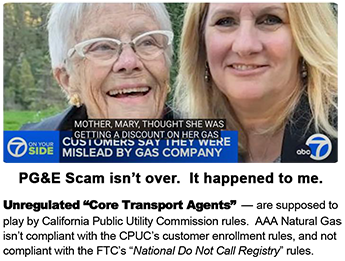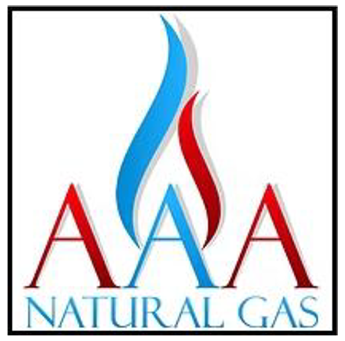

 March 12, 2025
March 12, 2025
AAA Natural Gas’ “Slamming” of PG&E Customers
PG&E Natural Gas Customers Scammed, Slammed!
One Bad Actor, “One Bad Apple Can Spoil the Whole Barrel,"
Has Never Been Truer Than With “AAA Natural Gas.”
AAA and Its Affiliate, “Tiger Natural Gas,” Have Racked Up
532 CPUC “Abusive Marketing” Consumer Complaints, $377,000
in $1,000 CPUC Fines, and a $3.7 Million Federal Class-Action Lawsuit Settlement!
by Patrick Monette-Shaw
I didn’t realize that I, along with all San Franciscans, should be aware and remain vigilant to prevent our natural gas utility service from being “slammed” to another provider without our explicit consent.
 I belatedly learned that, only after my natural gas service was “slammed” from PG&E to Tulsa, Oklahoma-based AAA Natural Gas without my consent on January 18, 2024 after I received two scam phone calls from so-called “sales agents” who claimed “We are [calling from] PG&E.”
I belatedly learned that, only after my natural gas service was “slammed” from PG&E to Tulsa, Oklahoma-based AAA Natural Gas without my consent on January 18, 2024 after I received two scam phone calls from so-called “sales agents” who claimed “We are [calling from] PG&E.”
Despite hanging up and ending both phone calls when I finally suspected they were scammers, my natural gas service was transferred from PG&E to AAA Natural Gas anyway. That transfer was cemented after I promptly called PG& within three business days to report I had received two probable scam phone calls, thinking PG&E would stop the scam of my account dead in its tracks.
PG&E didn’t. So, I consider PG&E was, therefore, complicit with the scam’s success.
The scammers were soliciting business for a so-called “Core Transport Agent” (CTA), without ever mentioning the name of the company they were soliciting business for, and masquerading as “We are PG&E.” CTA’s must register with, and be approved by, the California Public Utilities Commission (CPUC) to provide natural gas customers with alternative choices in their gas suppliers.
“Slamming” occurs when any gas supplier, whether a regulated public utility or a CTA, switches a customer to another natural gas supply system without that customer’s authorized consent. If a customer is switched to a gas supplier’s system without their authorized consent, that gas supplier has engaged in slamming. The CPUC fines any gas supplier engaging in such activities $1,000 for each instance of slamming.
CTA’s are unregulated gas suppliers. This means that if you have a billing error, any service dispute, or any other sort of problem with the CTA, the CPUC will not come to your assistance. You could be stuck fighting about disputes in court.
Before describing my specific “slamming” by AAA Natural Gas, a little history about the unregulated CTA’s might be of help in placing this in context.
Inadequate Consumer Protections Against Rogue CTA’s
The natural gas procurement market in California was deregulated in February 1991 with Public Utilities Commission Decision (D. 91-02-040). For unknown reasons, the CPUC didn’t adopt regulations governing CTA’s until Chapter 47 was incorporated into the Public Utilities Code in 2013, 22 years later.
 The CPUC does not regulate the rates or fees for gas services supplied by CTAs. However, in 2013, Senate Bill 656 required the CPUC to regulate certain aspects of CTA services having to do with consumer protections and the resolution of consumer complaints. In 2014, the CPUC issued D.14-08-043, which set interim registration standards for Core Transport Agents.
The CPUC does not regulate the rates or fees for gas services supplied by CTAs. However, in 2013, Senate Bill 656 required the CPUC to regulate certain aspects of CTA services having to do with consumer protections and the resolution of consumer complaints. In 2014, the CPUC issued D.14-08-043, which set interim registration standards for Core Transport Agents.
AAA Natural Gas became the CPUC’s “CTA0033” in 2017.
Five years later — fully 27 years after natural gas was deregulated in California in 1991 — on February 15, 2018 the CPUC’s Decision # D.18-02-002 established permanent financial, technical, and operational standards for CTA’s and set up a range of consumer protection processes.
Two important consumer protection measures, among others, are contained in California’s “Public Utilities Code” Chapter 4.7 regarding Core Transport Agents.
 The first important consumer protection provision, §987(a) states that the California Public Utilities Commission:
The first important consumer protection provision, §987(a) states that the California Public Utilities Commission:
“Shall maintain a list of core gas customers who do not wish to be solicited by telephone, by a gas corporation, marketer, broker, or aggregator for gas service, to subscribe to or change their core transport agent.” The [do not call list] list shall be updated periodically, but no less than quarterly.”
On February 8, 20118, CPUC Commissioner Peterman considered and issued a “Proposed Decision” concerning CTA’s that would have, among other things, added a penalty to any CTA that solicits any customer on the do not call list more than once, the CTA would be liable to the customer for $25 for each contact in violation of §987(c). The $25 penalty was a laughable slap on the wrist, and should have been far higher, as a deterrent to ensure CTA compliance. As it is, the current penalty for violations of the “National Do Not Call Registry” is $50,000 for each violation, starting with the first infraction.
And the language should have required that the fine would begin with the first violation of the Do Not Call list, not beginning with just the second violation.
Since the CPUC’s “Do Not Call List” would have contained the names of customers and their telephone numbers, there were privacy, confidentiality, and Internet data safety concerns to consider, along with developing an outreach advertising campaign program and the use of bill inserts to alert customers of the availability of the CPUC’s Do Not Call list and their right to be included on the list.
The Proposed Decision stated the Director of the CPUC’s Energy Division should form an internal task force of staff from various CPUC divisions to create the Do Not Call list database, and suggested the Utilities Enforcement Branch (UEB) be given the authority to issue a citation to the CTA if a violation of the Do Not Call list occurred, and develop a process to make the $25 penalty payable to the customer.
The Proposed Decision indicated the UEB would be authorized to bring a formal Resolution before the full Commission to implement such a citation mechanism. It appears CTA’s may not have opposed this rulemaking, but now seven years later it appears the UEB never set up a task force to examine the issues, and no such penalty against CTA’s has been added for violations of the CPUC’s Do Not Call list. That gives the CTA’s carte blanche to violate even the “National Do Not Call Registry” (at their own peril).
The proposed Decision rulemaking became effective when Commissioner Peterman issued his Order on February 8, 2018.
In response to a Westside Observer records request on July 22, 2024 for a CPUC web site address that proactively informs consumers how they can be added to the Do-Not-Call list required under §987(a) and the list of core gas customers who do not wish to be solicited by telephone, the CPUC responded saying it has no responsive records. Despite the provision in §987(a) the CPUC “shall maintain” such a list, it appears the CPUC decided to ignore and not comply with that provision of the state’s Public Utilities Code to provide meaningful consumer protections! The idea of a $25 penalty essentially died on the vine, because the CPUC never implemented a “Do Not Call” list. No such list exists, or has been updated periodically.
For good measure, the CPUC’s lame records request response asserted that as a courtesy to the records requestor, Commission staff noted that “customers may add themselves to the National Do Not Call Registry, which applies to registered telemarketers and should include Core Transport Agents.” Unfortunately the CTA’s appear to be skirting the “National Do Not Call Registry,” and the CPUC appears to be fully aware that is happening! The CPUC appears to believe it’s not  their problem. Baldly, the CPUC passed the buck, advising to file a federal complaint, implying it’s not a state-level concern!
their problem. Baldly, the CPUC passed the buck, advising to file a federal complaint, implying it’s not a state-level concern!
The second consumer protection provision under §984.5(b) of California’s Public Utilities Code requires the CPUC to issue “public alerts” about CTA’s attempting to provide core natural gas transport service in California in an unauthorized or fraudulent manner.
In response to another records request on August 1, 2024 requesting a list each and every public alert notice the CPUC has issued about problems with CTA’s in the decade since §984.5(b) was signed into law in 2013, the CPUC replied, saying:
“The Commission has no records that are responsive to your request for copies of public alerts about CTAs engaging in potential fraud or using abusive marketing techniques, since relevant Commission staff informs us that no public alerts have been issued.”
 Given the flood of consumer complaints alleging abusive marketing by 23 of the 38 CTA’s operating in California, it irresponsible the CPUC has issued not one public alert in the past dozen years!
Given the flood of consumer complaints alleging abusive marketing by 23 of the 38 CTA’s operating in California, it irresponsible the CPUC has issued not one public alert in the past dozen years!
Glut of Consumer Complaints Against CTA’s
Eight months after months after adopting on February 15, 2018 Decision D.18-02-002, the CPUC enacted Resolution UEB-003 October 25, 2018 adopting a “Core Transport Agent Citation Program,” delegating authority to the CPUC’s Consumer Protection and Enforcement Division (CPED) to issue citations of $1,000 per incident to CTA’s that fail to comply with the standards for verification of change in provider requirements described in D.18-02-002.
 Again, it took the CPUC 27 years after deregulating natural gas services in California before it finally realized that rogue CTA’s needed to have some sort of deterrence against possible fraudulent activity via a citations program for violations.
Again, it took the CPUC 27 years after deregulating natural gas services in California before it finally realized that rogue CTA’s needed to have some sort of deterrence against possible fraudulent activity via a citations program for violations.
The CPUC’s “Utilities Enforcement Branch” (UEB) began issuing citations and penalties against rogue CTA’s only in 2019.
In the past six years since 2019, there have been a flood of 4,900 customer consumer complaints filed with the CPUC involving abusive marketing, and a staggering 604 $1,000 citations, totalling $604,000 as shown in Table 1. The 604 citations and penalties represent just 12.4% of the complaints received — suggesting the CPUC isn’t aggressively investigating and punishing the rogue CTA’s to protect consumers and deter this predatory practice behavior.
 Table 1 contains a list of the 23 CTA’s that have racked up the 4,900 customer complaints since 2019 involving only abusive marketing practices, such as illegal enrollment of customers without their consent (excluding other complaints against these 23 CTA’s for billing and service problems). The list excludes another 15 CTA’s that have received neither consumer complaints alleging abusive marketing, nor penalties for enrollment violations, because those 15 CTA’s played by the CPUC’s rules for enrolling new customers.
Table 1 contains a list of the 23 CTA’s that have racked up the 4,900 customer complaints since 2019 involving only abusive marketing practices, such as illegal enrollment of customers without their consent (excluding other complaints against these 23 CTA’s for billing and service problems). The list excludes another 15 CTA’s that have received neither consumer complaints alleging abusive marketing, nor penalties for enrollment violations, because those 15 CTA’s played by the CPUC’s rules for enrolling new customers.

The UEB’s list of citations and penalties it has assessed against the 23 CTA’s is also available here.
How can it be that the top five CTA’s racked up a total of 3,385 abusive marketing complaints, and the CPUC felt no need to issue any consumer alerts? Those 3,385 represented nearly 70% of the 4,862 total abusive marketing complaints! And those top five CTA’s racked up a staggering $425,000 in UEB $1,000 citations!
A reasonable person would think that the 1,160 abusive marketing complaints filed against “SFE Energy” alone would have triggered a CPUC consumer alert at a minimum, right? Alternatively, the CPUC should have permanently revoked “SFE Energy’s” registration as an approved CTA.
 As for “AAA Natural Gas,” its significant 549 abusive marketing complaints and $377,000 in citation penalties should have also triggered a CPUC consumer protection alert! That didn’t happen. After all, AAA entered the ranks of being a CTA just one year before the UEB started issuing “invalid proof of enrollment authorization” penalties and has already racked up 377 such citations.
As for “AAA Natural Gas,” its significant 549 abusive marketing complaints and $377,000 in citation penalties should have also triggered a CPUC consumer protection alert! That didn’t happen. After all, AAA entered the ranks of being a CTA just one year before the UEB started issuing “invalid proof of enrollment authorization” penalties and has already racked up 377 such citations.
Of interest, the $371,000 penalty the CPUC assessed AAA Natural Gas in December 2024 involved the flagrant re-enrollment of 371 customers who had left AAA, but which AAA contended had not properly ended their contracts with AAA, so AAA didn’t need to bother with obtaining new consents-to-enroll from customers. The CPUC strongly disagreed, and assessed the $371,000 penalty!
During the CPUC’s delayed investigation of AAA’s re-enrollment of 437 customers, the UEB issued two “cease-and-desist” letters against AAA. On May 17, 2023 CPED’s UEB issued a cease-and-desist letter to AAA Natural Gas, because CPED was concerned AAA had re-enrolled 437 customers without obtaining new enrollment authorizations for the re-enrolled consumer’s/customers. In AAA’s “Plan of Correction” submitted in response, AAA claimed it “has instituted new directives to its customer service department that any future customer re-enrollment will require new and separate third-party verification.”
Just 10 months later, UEB was forced to issue a second Cease & Desist letter on March 29, 2024 directing AAA Natural Gas to cease and desist from enrolling customers until its Third-Party Verification (TPV) process fully complied with the requirements of D.18-02-002 and Resolution UEB-003 because AAA apparently had not sustained its compliance. AAA responded the same day and informed UEB staff that they had corrected their TPV process to ensure that it met all requirements in Resolution UEB-003 [for enrolling new customers].
How many AAA violations will it take for the CPUC to issue a consumer alert warning consumers about AAA’s “bad actor” status? After all, the CPUC should be able to order utility companies like PG&E, Southern California Gas, and San Diego Gas & Electric to include a “consumer alert” insert in utility customer’s monthly bills (at no cost to the CPUC)!
Unfortunately, members of the public have no way of knowing why the miscreant CTA’s racked up 4,862 abusive marketing customer complaints shown in Table 1, but the UEB saw fit to issue only 604 citations against the CTA’s — just 12.4% of the complaints filed with the CPUC.
 Mainstream Media to the Rescue
Mainstream Media to the Rescue
With the CPUC negligent on providing meaningful consumer protections against rogue CTA’s, it took “Karma” brewing against AAA Natural Gas before ABC TV Channel 7’s “7 on Your Side” team in San Francisco broadcast a longish 4-minute, 33-second news segment on April 19, 2024 about “AAA Natural Gas” / “AAA Energy Services” scamming the elderly and “slamming” customer’s natural gas service from PG&E to AAA Natural Gas.
The “7 on Your Side” segment, titled “Gas company leads elderly residents into unknowingly agreeing to pricey contracts,” reported that elderly residents thought they were signing up for a discount on heating bills, but instead they got switched to a third-party gas company — and on top of that, their bills doubled.
The segment focused on two elderly female customers, who were mislead into 36-month contracts they were (wrongly) told would save them money on their gas bills, contracts that required a 60-day cancellation period and a $100 early termination fee. The marketing phone calls featured 10- to 15-second delayed pauses between questions, and the victims’ guardians both stated the voices on the so-called recorded “Third-Party Verification” (TPV) MP3 audio files were not the actual voices of the two elderly women. The lengthy pauses between questions raised their suspicions.
 Both things happened to me, too (described below).
Both things happened to me, too (described below).
For several years, the Better Business Bureau (BBB) of Tulsa Oklahoma — where AAA natural Gas is located — and the CPUC have received extensive complaints from customers alleging that the TPV recordings of their fraudulent enrollment by AAA have included voices claiming to have been the customer’s voices, but were not, and may have been digitally edited by AAA’s marketing partner(s) or TPV company “agents.” This supports the assertion that AAA is simply a bad actor, and that the CPUC should have issued consumer alerts long ago.
How much evidence does the CPUC need to accumulate before it wakes up and smells the roses? Since the CPUC abdicated doing consumer alerts, it’s left to our mainstream media to get the word out to consumers!
Diary of My Own Scam Ordeal
As the victim of the slamming of my natural gas provider via a telephone scam, a year later I remain outraged by what happened. Although AAA returned my natural gas to PG&E’s bundled gas service without any charges and without an early contract termination fee, it was traumatic fighting this scam during the past year. I was lucky to escape without financial harm, but many other customers have not been so lucky, and paid dearly in hard, cold dollars.
 January 18, 2024
January 18, 2024
On January 18, 2024 I received two calls from two people from a company that lied repeatedly during the call representing they were PG&E employees, claiming — during what was supposed to be a “recorded voice log” (TPV) — “We are PG&E. The scam phone calls started off by asserting I was eligible to start receiving a 30% discount on my PG&E bill. The first caller, I believe a woman with a Chinese accent, kept asking me to provide my name, billing address, and PG&E account number. She repeatedly asked whether or not I was Chinese or had any Chinese people living in the apartment I rent. (Later, I had to wonder if I had been Chinese, whether the scammers would not have ended up scamming me!) She kept tell me to answer only using “Yes, yes,” or “No.”
I grew very concerned about whether it was a phone scam when she asked me to retrieve my recent PG&E bill and read her my Service Agreement number on page 5 of my PG&E bill. I told her that if she really was a PG&E employee, she should have access to my billing records and I shouldn’t have been asked to read her that Service Agreement number.
She then said she was adding one of her co-workers to the call. The caller who joined the call was a man with an Indian-sounding accent. He began by asking me the same questions the woman had asked me — interspersed with very long pauses where I could hear static or machinery noises in the background. He asked me to repeat the same information I had already provided, and he, too, asked me to answer his questions using “Yes, yes,” or “No.”
Very concerned I was becoming a victim of a fraudulent scam phone call, I hung up the phone, terminating the call. Within one minute the woman called back and angrily chastised me for ending the call “before we completed our process for determining your eligibility for the 30% discount.” I expressed my concern that I had been receiving similar potential scam phone calls about my energy service for months. She assured me that by completing her call offering me a discount, that the calls would stop. [A month after the January 18 calls, the recurring phone calls did stop, not a coincidence!]
 Because the second call was again taking so long, I hung up and ended the second call again, convinced it was a fraudulent phone call and that I might become a victim of a scam! I assumed that by ending the call without making any statement I was accepting their weird offers I had avoided being scammed.
Because the second call was again taking so long, I hung up and ended the second call again, convinced it was a fraudulent phone call and that I might become a victim of a scam! I assumed that by ending the call without making any statement I was accepting their weird offers I had avoided being scammed.
At no point during either of the two January 18 calls did they state they were an “Enrollment Agent” doing marketing calls on behalf of a CTA. They never told me the name of their company, nor the name of “AAA Energy Services” (d.b.a. as “AAA Natural Gas”). Instead, they repeatedly held themselves out as PG&E employees.
January 23, 2024
 Worried about the calls over the weekend, to make sure I called PG&E on Tuesday, January 23, 2024 to report that I suspected I had potentially been scammed by telephone on January 18, 2024. I spoke with a PG&E telephone agent named “Amanda” and then formally filed a formal grievance with PG&E that I suspected I had potentially been scammed.
Worried about the calls over the weekend, to make sure I called PG&E on Tuesday, January 23, 2024 to report that I suspected I had potentially been scammed by telephone on January 18, 2024. I spoke with a PG&E telephone agent named “Amanda” and then formally filed a formal grievance with PG&E that I suspected I had potentially been scammed.
I assumed that reporting the scam to PG&E would resolve the matter. It didn’t.
I should never have received the two scam marketing phone calls, because I have been continuously listed on the National “Do Not Call Registry” for over two decades, since August 30, 2003. It’s obvious that AAA Natural Gas and it’s Third-Party Verification contractor, “AnswerNet,” are not checking the “National Do Not Call Registry” before they place either marketing calls or TPV verification calls.

February 8, 2024
I was surprised to receive a welcome letter from “AAA Natural Gas” via U.S. Mail on February 8 thanking me for having chosen AAA to be the CTA for my gas service through PG&E. I had done no such thing. The “Welcome Letter” contained a “Terms and Conditions” insert with contract “legalese,” which asserted I had agreed to continue paying PG&E for “transport” delivery charges, and that separately I would be paying AAA for “gas supply charges,” ostensibly from the “point of delivery,” which was completely left undefined — other than to say I would be paying for the supply of AAA’s natural gas to “PG&E’s Citygate.” Also left unsaid was whether that “Citygate” delivery point was my apartment building in San Francisco where the gas would be “supplied,” to some other point in San Francisco, the California state boundary, perhaps all the way back to Tulsa, Oklahoma, or some other imaginary “point” in some unknown jurisdiction. I would never have agreed to, or signed, such a vaguely defined, opaque contract!
Also left unsaid was whether my “delivery point” might have been different from the 10 other apartments in my building! Why would the supply of my natural gas have come from a CTA and my neighbors’ supply from PG&E?
February 16, 2024
I received a letter from PG&E on February 16, 2024 that was dated February 1. PG&E’s February 1 letter was nine days after I had called PG&E on January 23 to report I suspected I had received two scam phone calls. Despite reporting the scam promptly to PG&E, PG&E took the word of AAA Natural Gas! The opening line of PG&E’s letter read:
“We received a request to change your gas commodity supplier from PG&E to a third-party gas supplier (also known as a Core Transport Agent or CTA) for gas service agreement # xxxxxxxxxx. This request came from the CTA and should have been issued with your permission.”
It was unnerving that PG&E took the CTA’s word that I had provided consent and approval, when I had obviously done no such thing. PG&E’s letter was shocking, because it assumed that I had a) Voluntarily enrolled with another gas supplier, and b) I had pre-approved changes to my PG&E account. I had not done either of those two things!
 On February 16, 2024 I also filed a formal written complaint with PG&E, reporting that I was surprised to receive a welcome letter from “AAA Natural Gas” via U.S. Mail on February 8 thanking me for having chosen AAA to be the CTA for my gas service through PG&E. I had done no such thing. I ended my February 16 complaint to PG&E requesting that PG&E restore my natural gas service to “bundled service,” since PG&E had been providing uninterrupted bundled natural gas service to me during the 25-plus years I’ve lived at this address.
On February 16, 2024 I also filed a formal written complaint with PG&E, reporting that I was surprised to receive a welcome letter from “AAA Natural Gas” via U.S. Mail on February 8 thanking me for having chosen AAA to be the CTA for my gas service through PG&E. I had done no such thing. I ended my February 16 complaint to PG&E requesting that PG&E restore my natural gas service to “bundled service,” since PG&E had been providing uninterrupted bundled natural gas service to me during the 25-plus years I’ve lived at this address.
I also asked PG&E on February 16 to have its Fraud Unit file a formal fraud complaint and fraud investigation with the CPUC and/or the California Attorney General that an “Enrollment Company” ostensibly working under some sort of paid retainer or reimbursement agreement with “AAA Energy Services” had fraudulently switched my natural gas provider  without my explicit permission and consent.
without my explicit permission and consent.
March 19, 2024
Then, on March 19, 2024 I filed a formal written complaint with the CPUC’s “Consumer Affairs Branch” (CAB), noting that on February 16, 2024 I had received a letter from PG&E dated February 1 asserting I had been switched [“slammed”] to AAA Natural Gas. In my complaint to the CPUC’s CAB, I noted I had not approved of being switched to AAA Natural Gas, and outlined the two scam phone calls, both of which I had hung up on to end the calls.
 March 24, 2024
March 24, 2024
I filed a similar complaint with the Better Business Bureau of Tulsa on March 24, 2024 against “Triple AAA Energy Services” (a.k.a. AAA Natural Gas) documenting the same scam phone call and illegal enrollment as an AAA customer; the BBB assigned it as complaint ID #2148041. When the BBB began investigating, AAA Natural Gas eventually provided the BBB with the so-called TPV MP3 audio file asserting it contained proof of enrollment. Although I had demanded on Thursday, March 28 that “AAA Energy Services” or “Tiger Natural Gas” provide me with the TPV MP3 audio file, I only obtained it through the good graces of the Tulsa BBB office on Tuesday, April 2, which had apparently received it from Rachael Strealy at “AAA Natural Gas.” Strealy is Tiger Natural Gas’ and AAA Natural Gas’ Director of Marketing and Customer Service.
 Not only do Tiger Natural Gas and AAA Natural Gas share the same Director of Marketing, Rachael Strealy, they are co-located in the same suite of offices at 7812 E. 108th Street, Suite “C” in Tulsa. It’s not understood whether the two companies are affiliates or subsidiaries of each other, or have some other sort of corporate structure. Tiger Natural Gas may be a “holding company.” The two companies also share the same owner, Lori Johnson. Johnson also owns “Tiger Canada, Inc.,” another holding company. In 2013, Tiger Natural Gas sought to enter the natural gas market in Nebraska and proposed also operating “doing business as” under the name of “Legacy Natural Gas.” Legacy Natural Gas also operates in Wyoming, and Tiger Natural Gas may operate in a total of 22 states.
Not only do Tiger Natural Gas and AAA Natural Gas share the same Director of Marketing, Rachael Strealy, they are co-located in the same suite of offices at 7812 E. 108th Street, Suite “C” in Tulsa. It’s not understood whether the two companies are affiliates or subsidiaries of each other, or have some other sort of corporate structure. Tiger Natural Gas may be a “holding company.” The two companies also share the same owner, Lori Johnson. Johnson also owns “Tiger Canada, Inc.,” another holding company. In 2013, Tiger Natural Gas sought to enter the natural gas market in Nebraska and proposed also operating “doing business as” under the name of “Legacy Natural Gas.” Legacy Natural Gas also operates in Wyoming, and Tiger Natural Gas may operate in a total of 22 states.
It’s not known who owns another company, “Tiger Gas Marketing Inc.,” located at P.O. Box #702437 in Tulsa, but that’s the same P.O. Box number that “Triple AAA Energy Services” in Tulsa uses, according to Google searches. It’s not known to what extent, if any, “Tiger Gas Marketing” handles marketing and sales telemarketing for AAA Natural Gas, or is a marketing agent for AAA, but that is a serious potential problem. It’s disturbing because Lori Johnson is reported to have begun her career in marketing.
 The BBB finally shared a copy of TPV MP3 audio file with me on April 2, 2024.
The BBB finally shared a copy of TPV MP3 audio file with me on April 2, 2024.
I set about transcribing the TPV file so I could have a complete verbatim transcript. The transcription took me two days to complete on April 4, painfully slow because the audio was so bad. A copy of the transcript is available on-line. On the 11-minte TPV audio, my extremely hoarse voice responding to questions was included only up to 0:3:20 [three minutes, 20 seconds] on audio. Beginning at 0:4:03 on audio, the unknown male’s strong voice (with an Indian accent) answered the remaining questions through the end of the recording; it was not my hoarse voice (hoarse because I am undergoing medical treatment for growths on my vocal cords).
April 7, 2024
 Shortly after transcribing the TPV file, I provided a copy of the verbatim transcript to both the BBB and to the CPUC’s Utilities Enforcement Branch on April 7, 2024 asserting that during the two scam phone calls I received on January 18, 2024 the so-called “Third-Party Verifcation” agent named “Gail” at AnswerNet.com was never brought on to the line with me to complete enrollment as an AAA natural gas customer, as AAA Natural Gas later tried to claim had occurred.
Shortly after transcribing the TPV file, I provided a copy of the verbatim transcript to both the BBB and to the CPUC’s Utilities Enforcement Branch on April 7, 2024 asserting that during the two scam phone calls I received on January 18, 2024 the so-called “Third-Party Verifcation” agent named “Gail” at AnswerNet.com was never brought on to the line with me to complete enrollment as an AAA natural gas customer, as AAA Natural Gas later tried to claim had occurred.
The TPV file was obviously a complete scam, since the verbatim transcript shows it had clearly been digitally edited, in part because the audiotape never included the Chinese woman’s voice asking me whether there were any Chinese people living in my apartment, or whether I was Chinese myself!
May 3, 2024
On May 3, Bernice Zhu, a Regulatory Analyst in the CPUC’s UEB, e-mailed me the TPV file Rachael Strealy at AAA Natural Gas had provided to the CPUC. Ms. Zhu asked me to confirm whether the TPV file AAA sent to the CPUC matched the TPV recording the BBB had shared with me. It did, exactly. I assumed, therefore, that there was a single TPV recording purporting to show proof of my enrollment verification. (I was wrong, because later, AAA claimed there had been two TPV recordings).
June 28, 2024
As Ms. Zhu and the CPUC continued their investigation, and submitted additional document requests to AAA Natural Gas over the next two months, my case dragged on. The CPUC asked me to sign and return a “Declaration” under penalty of perjury summarizing what had transpired in illegally enrolling me as an AAA Natural Gas customer. I returned the signed Declaration to Ms. Zhu on June 28, 2024.
 July 5, 2024
July 5, 2024
On July 5, 2024 the CPUC’s UEB issued Citation No. UEB-003-0197 against AAA for illegally enrolling me as a customer without valid proof of enrollment authorization, and assessed the paltry $1,000 penalty.
August 2, 2024
On August 2, AAA filed its Appeal to the CPUC’s citation, alleging, among other things, that my initial Declaration lacked credibility based on all the evidence, and that Consumer Protection and Enforcement Division (CPED), therefore, erred in relying on it. They also, laughably, alleged CPED erred in concluding that AAA did not obtain a compliant TPV, and CPED failed to conduct an appropriate investigation prior to issuing the citation. It took until AAA filed its August 2 Appeal before I or the CPUC learned AAA suddenly claimed there were two TPV recordings. It’s not known why AAA hadn’t submitted the second TPV recording to the CPUC in April when the CPUC received the first TPV file. Why had AAA suddenly produced a second TPV, only after the CPUC issued the $1,000 citation against AAA on July 5?
As the CPUC’s case moved through the Administrative Law Judge’s docket, Proceeding Number K2408005, several subsequent AAA Natural Gas filings falsely alleged that I had deliberately “withheld” material facts in the case, asserting I had not disclosed I relied on using my laptop’s text-to-voice feature during phone calls — which was pure poppycock. I had done no such thing during the two January 18 scam phone calls or at any other time with either AAA Natural Gas or with CPUC staff. AAA and its legal counsel, Holland & Knight may have been trying to insinuate I had somehow digitally altered the TPV recording, which of course I could not possibly have done — remotely or otherwise! I don’t have those technical skills.
January 30, 2025
I submitted a second Declaration to the UEB on January 30, 2025, disputing an assertion AAA Natural Gas had raised in its purported list of “Material Disputed Facts” in its 15-page “Response Regarding Evidentiary Hearings” dated January 17, 2025 alleging “Mr. Monette-Shaw regularly uses technology to assist with telephone calls.” That’s not true, and is an assertion made out of whole cloth, and is pure speculation and conjecture by AAA and Ms. Capritta! AAA and its legal counsel, Holland & Knight made up several lies and presented them during proceedings before the CPUC’s Administrative Law Judge Debbie Chiv. At no time on January 18, 2024 or thereafter, did I ever use my laptop’s text-to-audiofeature in any communications with AAA Natural Gas, or PG&E.
In the same filing, Rachel Strealy claimed she had called and spoken with me by phone, and “had played the TPV for him.” That was another lie, as Strealy never called and spoke to me by phone, so she could not possibly have played the 11-minute TPV file for me.
February 21, 2025
I submitted a third Declaration on February 21, 2025 contesting so-called “Undisputed” material facts in Section II-B of a February 18, 2025 “Joint Case Management Statement” beginning on page 5, because there were several items in that list that were factually untrue and inaccurate. I expressly disputed that a good majority of items in that list were not undisputed material facts. I refuted AAA’s repeated assertion that I “routinely” use technology to assist in any phone calls. I do not use assistive technology for any call (other than providing oral testimony during San Francisco Health Commission meetings)! 
February 26, 2025
On February 26, 2025 AAA Natural Gas came to its senses and agreed to drop its Appeal of the $1,000 fine in my case, CPUC Citation UEB-003-0197, and agreed to pay the fine. They claimed the parties (AAA and the CPUC) had agreed it was in the “interests of judicial economy” to drop AAA’s Appeal, but had agreed to do so only if AAA Natural Gas could do so without admission of wrongdoing, and that the CPUC agreed to dismiss AAA’s Appeal “with prejudice,” meaning that AAA would pay the $1,000 fine to escape having to face the issue of whether it had violated with California’s Public Utilities Code prohibition against violating the “do not call” list, but preventing me “with prejudice” from being able to file an amended complaint aboout the “do not call list” violation. Perhaps that was the point: To fend off further action on my part.  Hopefully, the dismissal will not apply to my pending complaint with the Federal Trade Commission over AAA Natural Gas’ and its marketing contractors for having violated the National “Do Not Call Registry.” AAA has reportedly paid CPUC’s $1,000 fine, but we don’t know yet on what date it was finally paid.
Hopefully, the dismissal will not apply to my pending complaint with the Federal Trade Commission over AAA Natural Gas’ and its marketing contractors for having violated the National “Do Not Call Registry.” AAA has reportedly paid CPUC’s $1,000 fine, but we don’t know yet on what date it was finally paid.
Tiger Natural Gas’ $3.7 Million Lawsuit Settlement
AAA’s affiliate, Tiger Natural Gas — which apparently thinks of itself to be a “Fierce Competitor” — was the subject of a Federal class action lawsuit in 2018 named “Fishman v. Tiger Natural Gas, Inc.,” before United States District Court Judge William Alsup. It was Case No. C 17-05351 WHA. Tiger had operated in PG&E’s territory since 2013 as a CPUC-approved Core Transport Agent, and was subject to CPUC regulations requiring proper customer enrollment through an approved customer sign-up process. That process required that the CTA — not its authorized sales agent(s) — shall retain the audio recordings of sales call for one year and the TPV audio of the customers’enrollment for two years. Tiger didn’t retain copies of the TPV’s for the two-year period.
 Of interest, Tiger Natural Gas’ employee, Rachael Harvock Strealy, provided testimony in the case that Tiger could receive copies of sales call records made by the sales agent upon request, in the event customer complaints arose. Part of the case involved sales pitches that failed to request and obtain customer consent to record the calls, as required by California Penal Code §632.
Of interest, Tiger Natural Gas’ employee, Rachael Harvock Strealy, provided testimony in the case that Tiger could receive copies of sales call records made by the sales agent upon request, in the event customer complaints arose. Part of the case involved sales pitches that failed to request and obtain customer consent to record the calls, as required by California Penal Code §632.
The case involved misleading telemarketing calls made on behalf of Tiger Natural Gas. Judge Alsup ended up approving an Order on February 22, 2019 proposing a gross settlement fund of $3.7 million to be distributed evenly between the 26,637 class members. As it was, California’s Recording Law provides for $5,000 in statutory damages per violation, which had placed Tiger at risk for $133 million in statutory damages plaintiffs had contended were owed to the class action members.
 Any left-over funds from class members who didn’t cash their settlement checks from the $3.7 million settlement were to be awarded to “The Utility Reform Network” (TURN) as a cy pres recipient to assist with TURN’s consumer protection advocacy. Cy pres recipients are typically organizations focused on consumer protections.
Any left-over funds from class members who didn’t cash their settlement checks from the $3.7 million settlement were to be awarded to “The Utility Reform Network” (TURN) as a cy pres recipient to assist with TURN’s consumer protection advocacy. Cy pres recipients are typically organizations focused on consumer protections.
Weirdly, Judge Alsup reduced the potential $133 million in statutory damages to just a $3.7 million settlement, because Tiger had apparently convinced Judge Alsup a serious risk existed that Defendants (including Tiger Natural Gas) would go bankrupt and the Class Action plaintiffs would be left with much less (if anything) even if Plaintiffs succeeded at trial. Alsup wrote: “… [D]efendants have demonstrated their limited financial resources and inability to pay a more reasonable settlement.” Alsup opined “Tiger is a family-owned business with one shareholder.” That appears to be Tiger’s Lori Johnson, poor, poor girl! How could Alsup have missed Tiger Natural Gas is 100% wholly owned by Lori Johnson? Or that Tiger’s application to do business in Nebraska had claimed Tiger had 100 stockholder shares issued with outstanding value of $12.8 million in 2022 in stockholder equity?
 So, Tiger Natural Gas and the other Defendants got off with a slap on the wrist, assessed just $3.7 million — 2.8.% of the potential $133 million Plaintiffs were statutorily due.
So, Tiger Natural Gas and the other Defendants got off with a slap on the wrist, assessed just $3.7 million — 2.8.% of the potential $133 million Plaintiffs were statutorily due.
That apparently left Tiger Natural Gas in 2019 to strike another day in California with its affiliate, AAA Natural Gas. After Alsup’s February 2019 Order, Tiger and AAA went on to start racking up the 532 abusive marketing complaints, and the $377,000 in CPUC fines. Those may have been avoided entirely, had Judge Alsup not let Tiger Natural Gas off of the bankruptcy guillotine, and had allowed Tiger to fade away in bankruptcy oblivion. After all, Ms. Johnson had earned it!
Thanks, Judge Alsup, for inadequate consumer protection against a rogue corporate bad actor, and its owner!
 Consumer Warning
Consumer Warning
Readers who encounter similar scams “slamming” your natural gas service should fight aggressively against AAA Natural Gas, or any other rogue Core Transport Agents who scam you. Demand the TPV audio files. Transcribe the recordings, and pinpoint where on the audiotapes it is clear it is not your voice, or the voice of anyone in your household who could approve such a change to your utility service accounts.
File a complaint with the CPUC’s Consumer Affairs Branch (CAB), and advocate that the CAB escalate your complaint to the CPUC’s Utility Enforcement Branch (UEB) and their Regulatory Analysts. Stay on top of communicating aggressively and frequently with CPUC staff to make sure your complaint isn’t just swept under the regulatory rug.
Be sure to check your utility bills carefully, and check the gas section of your gas and electric bill regularly to make sure your aren’t “slammed” to a CTA without your consent. Share this news with your neighbors and friends, and be aware these scammers target the elderly. If you get a call that makes you suspect it involves scammers, hang up on them promptly.
 And if you were on the “National Do Not Call Registry” and received telemarketing calls from AAA Natural Gas and/or its TPV verification provider, AnswerNet, be sure to file a complaint with the FTC’s “Do Not Call Registry” staff. After all, while the CPUC’s measley $25 “Do Not Call” violation penalty never took effect, and since the $1,000 CPUC penalty for illegal customer enrollment hasn’t deterred AAA from racking up 549 “abusive marketing” complaints, perhaps the FTC’s $50,120 per violation penalty might force AAA to finally start complying with the law about fraudulent customer enrollment and force AAA to cease-and-desist from it’s telemarketing enrollment of consumers on the “National Do Not Call Registry”!
And if you were on the “National Do Not Call Registry” and received telemarketing calls from AAA Natural Gas and/or its TPV verification provider, AnswerNet, be sure to file a complaint with the FTC’s “Do Not Call Registry” staff. After all, while the CPUC’s measley $25 “Do Not Call” violation penalty never took effect, and since the $1,000 CPUC penalty for illegal customer enrollment hasn’t deterred AAA from racking up 549 “abusive marketing” complaints, perhaps the FTC’s $50,120 per violation penalty might force AAA to finally start complying with the law about fraudulent customer enrollment and force AAA to cease-and-desist from it’s telemarketing enrollment of consumers on the “National Do Not Call Registry”!
Don’t just roll over, play dead, and let these bad actors scam you!
Monette-Shaw is a columnist for San Francisco’s Westside Observer newspaper, and a member of the California First Amendment Coalition (FAC) and the ACLU. He is a Childless (and catless) Cat Daddy, and voter for 50 years. He operates stopLHHdownsize.com. Contact him at monette-shaw@westsideobserver.com.